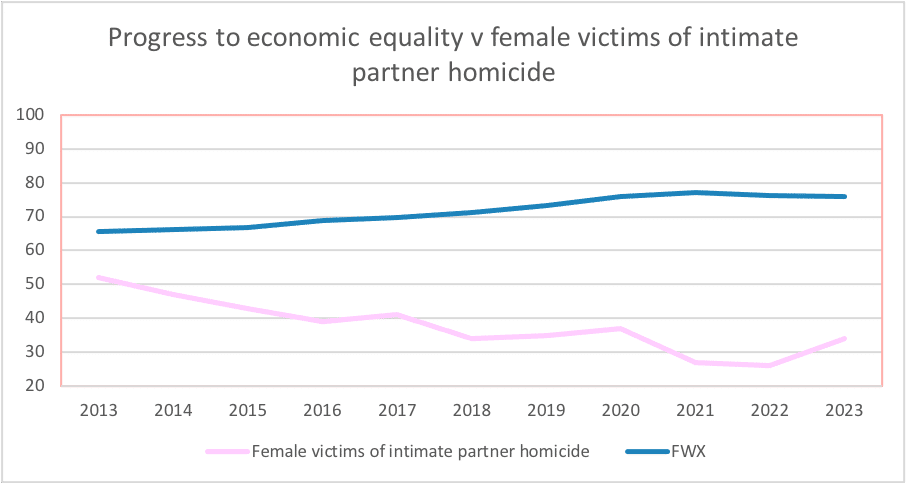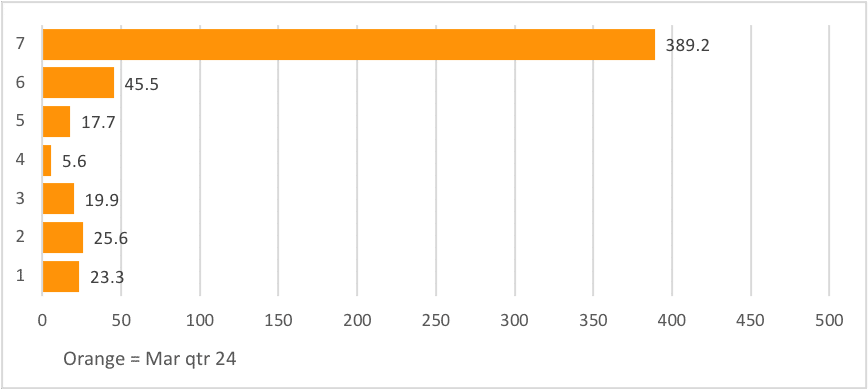Progress to economic equality in Australia rebounded in the March quarter following the worst annual setback in a decade but has been accompanied by a sudden increase in gender-based violence.
The latest Financy Women’s Index (FWX) gained 2 points (2.7%) to 78.3 points in the March quarter of 2024 and is now 3.66 points higher than where it stood in March 2023.
Financy founder Bianca Hartge-Hazelman says while the progress in financial equality is encouraging, the rise in domestic violence over the same period is deeply concerning.
“Over the past ten years there has been a positive correlation between economic equality progress and declining gender-based violence*; however recently this correlation has started to show signs of decoupling,” says Hartge-Hazelman.
“Whilst the long-term trend in both gender financial equality progress and gender-based violence is one of improvement over the last decade, the alarming surge in female deaths this year is of significant national concern.

Source: AIC NHMP 1989–90 to 2022–23 and Financy 2024
*as measured by intimate partner homicides of a woman by a male.
“It is too early to know if this trend will continue, but if we continue to see this many tragedies (43 women killed this year already) then it will undermine economic progress and equality for women,” she says.
Ms Hartge-Hazelman added that the main drivers of the improvement in the Index were employment and underemployment.
“The rising cost of living pressures coupled with improved flexible work opportunities are two significant factors helping to drive the growth in female employment,” she says.
The FWX Employment sub-index shows an improved score to 75.2 points out of 100 in the March quarter as women increased their number of monthly hours worked by 2.6% compared to 1.4% for men.
The capacity of women to engage in paid work, as measured by the available working-age population numbers and monthly hours worked, has improved to 65% from 63% compared to 86% for men, up from 85%.
The FWX Underemployment sub-index moved up by 0.88 points to 71.8 points in the March quarter, as female underemployment improved at a faster pace than male underemployment deterioriated.
Despite commendable progress, the fact remains that gender equality advancement is happening at a painfully slow pace and the impact of the 2023 setback has been very disheartening.
“Every step forward in the Financy Women’s Index is welcomed,” says Nicki Hutley, independent economist. “But a truly gender-inclusive society will need both faster and broader progress, including in areas of social inequality and, as this quarter’s report points out, for gender-based violence and societal attitudes more broadly.”
Also speaking on the subject, Dr Leonora Risse of the University of Canberra says that “While we are making strides in women’s economic progress, we are also encountering retaliation and resistance that pushes us in the other direction.
“This all points to a drastically missing piece in our approach to gender equality: if we are going to economically empower women, we need to nurture a society that is not afraid of women being empowered,” says Dr Risse.
Dr Shane Oliver, chief economist at AMP, says that the rebound in reported violence towards women reminds us that “we can’t simply assume that rising financial equality will necessarily translate to falling gender-based violence. In fact, there could be perverse effect where it may increase it, if some men feel they are being left behind.
“At the very least this shows the need to highlight that women’s financial equality is good for both women and men. Men need to be brought along the journey too,” says Dr Oliver.
Timeframes to economic equality

Source: Financy Women’s Index March 2024
The best performing area of the Financy Women’s Index in the March quarter with the smallest time frame to achieving gender equality is in ASX 200 Board Leadership with a 5.6 year wait, compared to 17.7 years in Superannuation, 19.9 years in Underemployment, 23.3 years in the Gender Pay Gap (as the median timeframe to gender equality) and 25.6 years in Employment, 45.5 years in Unpaid Work and 389.2 years in Education.
Financy covers gender finance, diversity, inclusion and ESG issues. We advocate for gender equity change through the Women’s Index report and help businesses take action on DEI through tech solutions like IMPACTER.













